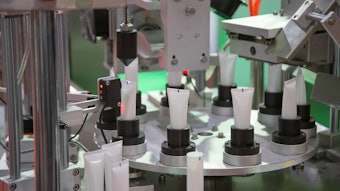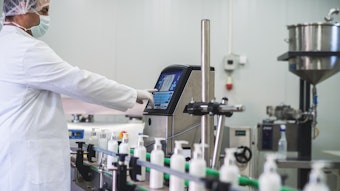
Log in to view the full article
Read this article and more in the September 2023 digital magazine.
Regulatory authorities debate whether cosmetics should be considered part of a larger treatment plan for improving consumer health and well-being.1 Cosmetic ingredient exhibitions and innovation trends also lean in the direction of skin health, wellness and psychodermatology. And, according to a recent trends article on in-cosmetics Global 2023,2 a focus on skin immunity and biology of inflammation and their cross-over with anti-stress techniques and wellness is in vogue.
Indeed, fundamental research disciplines, biological processes such as skin immunology and defense regulation, anti-inflammation and anti-aging (or inflammaging) and the science behind wellness and stress reduction are concepts merging beauty and therapy. Boosting emotional responses to products and ingredients, and introducing feel-good molecules also play a part, as does the recent surge in neurocosmetics for soothing and reducing sensitive skin symptoms.3
The concept of “emotion in beauty” was also highlighted at the NY SCC Suppliers’ Day. There, ingredient suppliers and service providers underscored their efforts toward positive beauty: measuring galvanic responses to skin care, consulting neuro-experts for product testing and introducing ingredients as well as product formats to help reduce stress; e.g., lotion beads to be massaged into skin. Related concepts at the event extended the sensitive skin story with advanced sensitivity and allergen testing, new biomarkers and an in vitro model complete with nerve fibers.
These trends continue to drive the narrative of psychodermatology forward – with support from recent research, select examples of which are described next.
Psychodermatology as an Integrated Approach
Itching: Itching (pruritus) is a key symptom in allergic and skin conditions. It majorly impacts the quality of life of patients and can be exacerbated by psychological stress. A recent paper explored pruritis, allergy and autoimmunity in terms of understanding psychodermatological diseases.5
According to the authors, there is a subtle interaction between allergic and autoimmune mechanisms in the human body. Allergy is an altered reactivity to exogenous antigens (allergen), defined as an immediate hypersensitivity mediated by immunoglobulin E (IgE). Our immunological understanding of atopy is related to an immediate hypersensitivity reaction to environmental antigen, involving T-helper 2 (Th2) responses and the IgE production. Some allergic reactions may persist and eventually lead to autoimmunity, a role that has been suggested in psoriasis and atopic dermatitis.5
Atopic dermatitis: A recent review article considered atopic dermatitis (AD) in relation to psychodermatology.6 AD is a chronic disease of the skin with significant itch and phases of exacerbation and remission. The disease presents with changes in the skin barrier and chronic inflammation and is associated with an increased risk to mental health, e.g., depression and anxiety. Per the authors, psychological stress may have impact on immunological factors with an up-regulation of neuropeptides in the central nervous system and secondary involvement of endocrine glands, the peripheral nervous system and immune resident cells in the skin.6
Psoriasis: Psoriasis was considered in relation to psychodermatology in an article positioned for clinicians.7 Here, psoriasis is described as a chronic inflammatory disease with a global prevalence of 2% and significant impact on mental health. The disease is a complex condition with multifactorial psychological and biological drivers associated with high levels of distress and is often under-recognized.
In the UK, for example, access to psychological support for people living with skin conditions is limited, according to the article. Reports found that while up to 98% of patients felt their skin disease had affected their emotional or psychological well-being, only 18% sought help. This care gap was attributed to being unaware of the available – albeit limit – services, such as cognitive behavioral therapy, meditation and mindfulness-based therapy and motivational interviewing.7
Connecting psychological distress with personality traits, one source8 reported that patients with psoriasis are more likely to be unable to recognize or describe their own emotions (alexithymia). They also are said to have a lack body awareness and possess a type D (distressed) personality, tending to carry negative emotions across many situations but avoid expressing those emotions because of fear of rejection or disapproval.8 Those at risk are primarily women, younger patients or patients with onset at a younger age and patients who self-assess their psoriasis to be severe and have lesions on visible or sensitive areas.9
Synchronization Through Skin Care
As a final thought, one other concept connecting the underlying facets of psychodermatology is synchronization. The skin plays many roles in the human body; from psychosocial aspects to maintaining vital functions, both of which are key in our interactions and synchronization with others and the world. Could skin conditions represent a loss of such synchronization? They are often linked with other desynchronization aspects such as sleep disorders and depression but research has yet to unravel the interplay between cutaneous and central pathways linking inflammation and psychological stress response.4
Related to synchronization, people yearn to be accepted by others. Western society attaches a considerable importance to attractive, healthy appearances. Today, most cultures’ ideal beauty includes healthy, homogeneous skin. As humans, we operate within a wider context of a society, prone to the influence of advertising, social media, celebrity culture and surrounded by images of ideal appearance. These images are replete with explicit or implicit messages that may fuel dissatisfaction, worry and anxiety – feelings of not belonging. To a greater or lesser degree, most individuals internalize the imperative to reduce the gap between personal appearance and the ideal image – evolutionarily wired to do so and often motivated by belief that it will help acceptance and enhance relationships and social lives.
Research shows that psychological problems related to visible skin conditions are prevalent and serious, sustaining negative emotions such as social anxiety and depression, and transitory emotions such as shame, embarrassment, anger, guilt and self-consciousness. Significant challenges are experienced in relation to self (lack of confidence) and others (difficulty relating to friends).
The burden felt when forming friendships and romantic relationships stems from unwanted rejection from others, real or perceived. Reactions such as public comments, staring or avoidance can be taken very personally and exacerbate a vicious cycle of feeling inadequate and vulnerable, leading to social avoidance, a sense of loneliness and isolation.10
The more a person has internalized the “ideal” messages from peers and social media, and the greater they perceive the discrepancy to be between these and their own appearance, the more likely they are to feel dissatisfied and unhappy. Interestingly, evidence suggests that a person’s actual appearance as judged by others does not reflect their level of happiness.11
If a skin condition represents the loss of synchronization, it truly may feel like a barrier to bonding. It is apparent that the value placed on appearance has become greater and more disproportionate to other aspects of self-esteem and self-worth.
For the personal care industry to help people overcome this barrier, it should seek to boost two elements. First, it should encourage a person’s outlook on life and broader psychological makeup; e.g., propensity to optimism, resilience and ability to deal with stress. Second, it should alter the role appearance plays in self-concept and self-esteem. Skin care should help us holistically to synchronize and support the self by self-care, raising confidence, self-worth and self-esteem.
References
1. Steventon, K. (2022, Dec 27). Building evidence to link personal care, self-care and wellness. Available at https://www.cosmeticsandtoiletries.com/magazine/article/22618452
2. Cosmetics & Toiletries. (2023, Mar 31). 15+ Trends in cosmetics innovation at in-cosmetics Global 2023. Available at https://www.cosmeticsandtoiletries.com/news/event-coverage/news/22793755
4. Cosmetics & Toiletries. (2023, May 2). 8+ Key concepts and trends from NYSCC Suppliers' Day 2023. Available at https://www.cosmeticsandtoiletries.com/news/event-coverage/news/22860765
5. Ferreira, B.R., Pio-Abreu, J.L., Figueiredo, A. and Misery, L. (2021). Pruritus, allergy and autoimmunity: Paving the way for an integrated understanding of psychodermatological diseases? Frontiers in Allergy. 2 688999; https://doi.org/10.3389/falgy.2021.688999
6. Torales, J., Malvido, K., … O'Higgins, M., et al. (2022). Atopic dermatitis in psychodermatology: A concise review for dermatologists. Italian J Derm and Venereology. 157(4) 301-305; https://doi.org/10.23736/S2784-8671.21.07139-5
7.Blackstone, B., Patel, R. and Bewley, A. (2022). Assessing and improving psychological well-being in psoriasis: Considerations for the clinician. Psoriasis. 12 25-33; https://doi.org/10.2147/PTT.S328447
8. Whitten, C. (Nov. 2021). What to know about Type D personality. Available at https://www.webmd.com/balance/what-to-know-about-type-d-personality
9. Lim, D.S., Bewley, A. and Oon, H.H. (2018). Psychological profile of patients with psoriasis. Annals of the Academy of Medicine. 47(12) 516-522; https://pubmed.ncbi.nlm.nih.gov/30636268/
10. Rumsey, N. (2018). Psychosocial adjustment to skin conditions resulting in visible difference (disfigurement): What do we know? Why don’t we know more? How shall we move forward? Intl J Women's Derm. 4(1) 2-7; https://doi.org/10.1016/j.ijwd.2017.09.005
11.Seligman, M.E. (2002). Authentic happiness: Using the new positive psychology to realize your potential for lasting fulfillment. Available at https://www.researchgate.net/publication/247714802_Authentic_Happiness_Using_the_New_Positive_Psychology_to_Realize_Your_Potential_for_Lasting_Fulfillment










